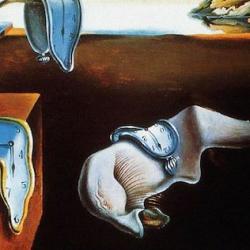“One could say that age is to time what place is to space,” says Robert Pogue Harrison (Juvenescence, 3), and he’s surprising that with all the attention given by philosophers to time, so few make the connection with age.
Even Heidegger, who understood time as “a kind of movement, or kinesis, that allows the phenomenon to appear and be taken up in thought and word” and who recognized that “place, in its situated boundedness, is more primordial than space” – even Heidegger didn’t pay any attention to age. This surprises Harrison because “when it comes to Dasein’s existential determinations, age remains as fundamental as thrownness, projection, fallenness, being-unto-death, and being-with-others” (3).
Age shapes perception and apprehension: “A young boy and his grandfather in an old-growth forest of the Pacific Northwest may cast their eyes on the same giant redwood, yet they do not see the same phenomenon. Because of their age difference, it appears one way to the boy, another to his elder.” This isn’t projection: The sky appears ageless, but “my only access to the sky, and to the world of phenomena in general, is from within my own noncelestial age.” Identity is self-sameness through time, but equal account must be taken of how age introduces “a differential into identity’s equation” and thus introduces a differential “into the appearance of things” (4).
Age isn’t simply chronological, any more than place is simply extension. Harrison doubts that his brain and his mind are the same age, since “my mind is linked by affiliation and inheritance to other minds, both past and present. . . . I have loved minds as old as Anaximander and Plato. That makes my mind, whose thought is informed by theirs, over two thousand years old. Whether that makes it older or younger than my brain is anybody’s guess.” His soul is a different age yet, since it is “at least as old as Moses, Homer, and Dante, whose legacies form part of my psychic selfhood.” Not to mention the fact that different parts of our bodies age at different rates (8).
To talk of “relativity” here it drastically to oversimplify the complex “manifold of body, mind, and soul, each of which has an enfolded dynamic of its own.” Given this complexity, “the concept of relativity does as much to obscure as to clarify the bewildering nexus that keeps this manifold mysteriously united in a single person, even as it remains in a state of constant flux, unfolding its unity in what we call – vaguely enough – time” (9).
He invokes Vico to suggest that the complex of “ages” in my individual person is embedded in a cultural, historical age. From Vico, we learn that “the phenomenon’s appearance is conditions by a society’s cultural age as much as it is conditioned by an individual’s existential age.” The shifts and changes of a “society’s cultural mentality . . . play a formative role in how the phenomenon reveals itself to those who share in that mentality.” Thus truth itself “has its age, or better, its ages” (9-10).














